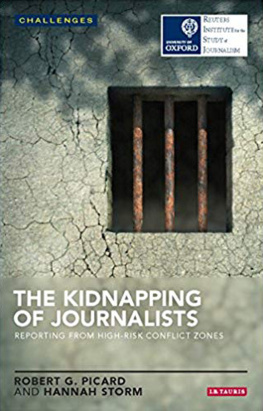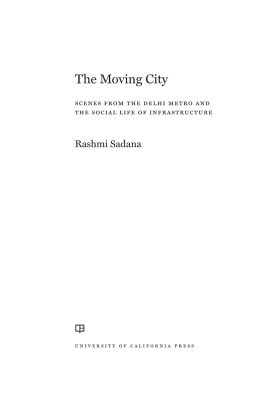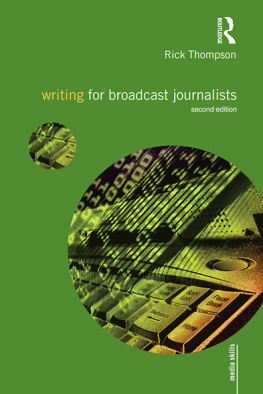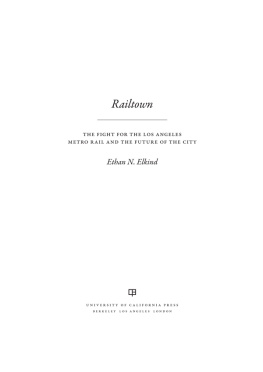Metro Newspaper Journalists in China
This book explores how journalists at local metro papers in a southwestern China metropolis give meaning to their work and how these meanings are shaped by the specific social environment within which these journalists operate. These metro papers provide the bulk of daily news to the general public in China, yet are often understudied compared to the countrys Party news outlets. Informed by fieldwork in four metro newspapers, the book puts forward a grounded theory for exploring journalists occupational culture: the aspiration-frustration-reconciliation framework.
Zhaoxi (Josie) Liu is an Assistant Professor in the Department of Communication at Trinity University, USA.
Routledge Focus on Journalism Studies
1Metro Newspaper Journalists in China
The Aspiration-Frustration-Reconciliation Framework
Zhaoxi Liu
Metro Newspaper Journalists in China
The Aspiration-Frustration-Reconciliation Framework
Zhaoxi Liu
First published 2017
by Routledge
711 Third Avenue, New York, NY 10017
and by Routledge
2 Park Square, Milton Park, Abingdon, Oxon OX14 4RN
Routledge is an imprint of the Taylor & Francis Group, an informa business
2017 Taylor & Francis
The right of Zhaoxi Liu to be identified as author of this work has been asserted by him/her in accordance with sections 77 and 78 of the Copyright, Designs and Patents Act 1988.
All rights reserved. No part of this book may be reprinted or reproduced or utilised in any form or by any electronic, mechanical, or other means, now known or hereafter invented, including photocopying and recording, or in any information storage or retrieval system, without permission in writing from the publishers.
Trademark notice: Product or corporate names may be trademarks or registered trademarks, and are used only for identification and explanation without intent to infringe.
Library of Congress Cataloging-in-Publication Data
A catalog record for this book has been requested
ISBN: 978-1-138-67500-1 (hbk)
ISBN: 978-1-315-56092-2 (ebk)
Typeset in Times New Roman
by Apex CoVantage, LLC
To My Parents
Contents
I am deeply in debt to Dr. Judy Polumbaum for this volume. She was there since the very inception of the idea of this project and contributed significantly to an earlier version of this volume. Drs. Dan Berkowitz, Frank Durham, Tim Havens, and Wenfang Tang also offered invaluable advice and feedback.
I want to thank my editor, Ms. Felisa Salvago-Keyes, for her faith in the project and wonderful support throughout the course of producing this book. My sincere thanks also go to the two anonymous reviewers for their insightful comments and suggestions, which greatly helped me enhance the manuscript. Drs. Jennifer Henderson and Bill Christ, as well as Professor Sammye Johnson, also helped with the project.
Also, my deep gratitude to all the journalists I encountered in Kunming during my field study. They did not just open their newsrooms to me, but also their hearts. I was deeply touched by their commitment, industriousness, and perseverance. I salute them and wish them the very best.
Finally, I have to thank my familymy parents, sister, husband, and two adorable childrenfor their tremendous love and constant support. My parents, half the world away, are my strongest supporters and most passionate cheerleaders. This book is dedicated to them. Unfortunately, my father passed away right before the publication of this volume. This book is for him.


Newsrooms of three Kunming metro papers where the field research for this volume was conducted.

The army of eBikes in Kunming.

Kunming street.
(All photos were taken by Zhaoxi Liu in 2011.)
Xiao Zhou1 is well known among journalists in Kunming as a daring investigative reporter. Other journalists speak of him as legendary and invincible.
He describes himself, however, as a hedgehog that turned into a mouse after running through the woods, having lost all his spikes in battle.
Born in the 1960s, Xiao has worked in Kunming newspapers for 10 years. He says his ideal is to make journalism do more and serve more people, and he professes to love doing investigative reporting. Revealing a judge sleeping with underage prostitutes is to make the judiciary and law enforcement fairer. Revealing drawbacks of the political system is in hopes of making the execution of political power cleaner and fairer, he says.
Xiao wants to be a swordsman who acts on behalf of the people, and the stories he and others tell illustrate how boldly he has gone about this mission. Once, he recalls, he had an argument with a propaganda official at the provincial police bureau over a story and the official pointed a gun to his head and threatened to shoot him dead. I said you go ahead and shoot. If you dont shoot me, I have recorded todays conversation and I will later post it on the Internet. I then returned to the newsroom and saw that police cars already had arrived. Police officers were telling people in the newsroom not to let me touch any computer. I asked if he was afraid. Of what? he responded. [The official was] just trying to scare me (October 15, 2011).2
Like many journalists I met in the course of the current study, Xiao has seen his aspirations come up against hard realities over the years. One night a few years ago, for example, a tipster calling on a news hotline reported that a real estate company had just leveled the ground by Dianchi Lake and buried alive two migrant worker children sleeping in a tent next to the lake. Xiao and a photographer went to cover the story. Afterwards, late that night, their editor invited them to have tea and reminded them that, We are a market paper, and told them the real estate company had paid 1.3 million yuan of advertisement fee in exchange for the newspapers silence. The story never ran.
Xiao is dedicated to his job because he wants to solve peoples problems, an aim, however, most of his stories fall short on as far as he is concerned.
Xiao once got tips from villagers in his hometown, a rural county west of Kunming, revealing government-supported massive illegal tree felling. He went to investigate the incident and was invited to meet with one of the top local officials. The official begged him to control the direction of the story for the sake of his hometown. Xiao ignored the officials plea and the story was published. To his surprise, right before higher authorities were about to punish the local government, main officials related to the misconduct were transferred to other offices, which effectively allowed these officials to escape being held accountable.















